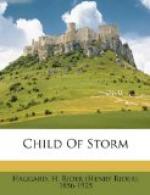“O Macumazana,” said Panda in great distress, “I know well that you are not to blame, and already I have sent out a regiment to stop this fighting, with command that those who caused it should be brought before me to-morrow for judgment. I am glad indeed, Macumazahn, that you have escaped without harm, but I must tell you that I fear henceforth your life will be in danger, since all the Usutu party will hold it forfeit if they can catch you. While you are in my town I can protect you, for I will set a strong guard about your camp; but here you will have to stay until these troubles are done with, since if you leave you may be murdered on the road.”
“I thank you for your kindness, King,” I answered; “but all this is very awkward for me, who hoped to trek for Natal to-morrow.”
“Well, there it is, Macumazahn, you will have to stay here unless you wish to be killed. He who walks into a storm must put up with the hailstones.”
So it came about that once again Fate dragged me into the Zulu maelstrom.
On the morrow I was summoned to the trial, half as a witness and half as one of the offenders. Going to the head of the Nodwengu kraal, where Panda was sitting in state with his Council, I found the whole great space in front of him crowded with a dense concourse of fierce-faced partisans, those who favoured Cetewayo—the Usutu—sitting on the right, and those who favoured Umbelazi—the Isigqosa—sitting on the left. At the head of the right-hand section sat Cetewayo, his brethren and chief men. At the head of the left-hand section sat Umbelazi, his brethren and his chief men, amongst whom I saw Saduko take a place immediately behind the Prince, so that he could whisper into his ear.
To myself and my little band of eight hunters, who by Panda’s express permission, came armed with their guns, as I did also, for I was determined that if the necessity arose we would sell our lives as dearly as we could, was appointed a place almost in front of the King and between the two factions. When everyone was seated the trial began, Panda demanding to know who had caused the tumult of the previous night.
I cannot set out what followed in all its details, for it would be too long; also I have forgotten many of them. I remember, however, that Cetewayo’s people said that Umbelazi’s men were the aggressors, and that Umbelazi’s people said that Cetewayo’s men were the aggressors, and that each of their parties backed up these statements, which were given at great length, with loud shouts.
“How am I to know the truth?” exclaimed Panda at last. “Macumazahn, you were there; step forward and tell it to me.”
So I stood out and told the King what I had seen, namely that the captain who favoured Cetewayo had begun the quarrel by striking the captain who favoured Umbelazi, but that in the end Umbelazi’s man had killed Cetewayo’s man, after which the fighting commenced.




